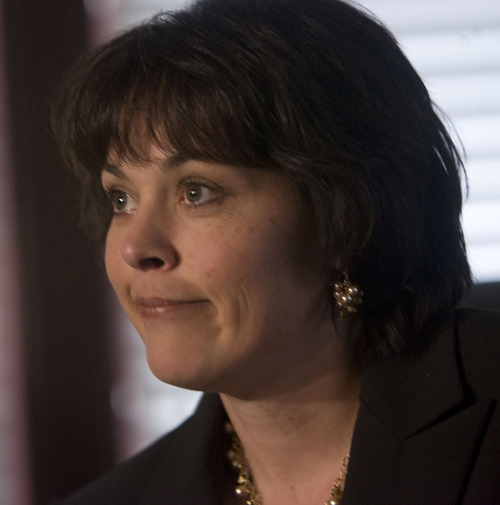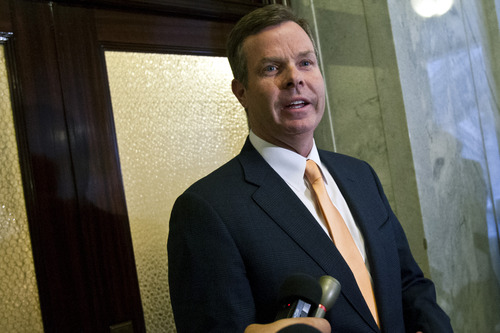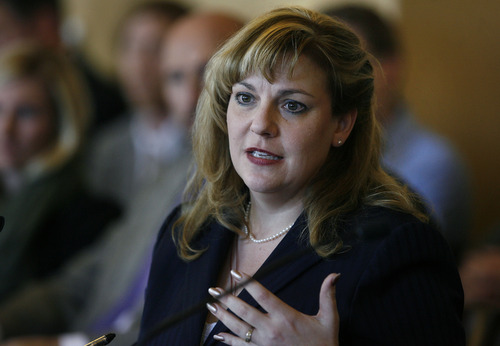This is an archived article that was published on sltrib.com in 2013, and information in the article may be outdated. It is provided only for personal research purposes and may not be reprinted.
Utah House members will meet Wednesday in an unprecedented session to create a committee to investigate allegations of misconduct by Attorney General John Swallow.
What is less certain is whether those key to the nine-member House committee's inquiry will cooperate with the panel in light of ongoing federal, state and county investigations into potential criminal activity in the attorney general's office.
Brett Tolman, a former U.S. attorney for Utah, said it's natural for people to want to testify to try to defend themselves, but their attorneys would likely caution them that, by doing so, they could be exposing themselves to criminal liability.
"In this instance, you would think that, more often than not, individuals do not testify in front of a committee like this," Tolman said. "But I think there is enormous pressure to testify, and I think there are repercussions if they don't, because then the court of public opinion often thinks a person who refuses to testify has something to hide."
Several, including Jeremy Johnson, whose allegations against the attorney general set off the firestorm more than six months ago, may not be willing or able to testify to the committee.
Johnson, founder of I Works, originally accused Swallow of trying to help arrange a bribe for U.S. Senate Majority Leader Harry Reid, D-Nev., to derail a Federal Trade Commission investigation into the St. George business. Reid and Swallow have denied any such scheme.
But a federal judge has issued a gag order in an I Works-related criminal case against Johnson, preventing the businessman from publicly discussing the matter.
"I read that to mean we're not to discuss any of it publicly at all," said Johnson's attorney, Ron Yengich, which would presumably preclude giving testimony to House investigators. "I think it applies to everything. For lack of a better term, that umbrella hangs over the whole Johnson case."
Swallow's attorney, Rod Snow, wrote to legislators last week, arguing that the scope of the House investigation should be limited to events that took place since his client took office in January. In an interview, he called the committee's mission — to look at events dating back to 1990, when Swallow became a lawyer — "inappropriate."
Still, Snow said that Swallow welcomed the investigation when it was announced and he is not backtracking from his previous commitment to cooperate with the House inquiry.
It remains to be seen if others — such as former Attorney General Mark Shurtleff and his confidant Tim Lawson — would agree to testify.
Shurtleff and Lawson declined to comment for this story.
Kirk Torgensen, the chief deputy attorney general, said Tuesday he would cooperate fully and "provide any information I have personal knowledge about."
Marcus Mumford, attorney for jailed businessman Marc Sessions Jenson, said he expects his client, who has alleged Swallow and Shurtleff extorted lavish trips and gifts from him, would cooperate.
"Mr. Jenson intends to cooperate with all ongoing investigations in this matter, including as it relates to the Utah House," Mumford said.
When the Connecticut House ventured down the path of an impeachment investigation of then-Gov. John Rowland in 2004, 13 of the 18 witnesses called by its committee refused to testify because of an ongoing federal probe.
And in the Illinois impeachment of Gov. Rod Blagojevich, federal attorneys objected to the committee calling numerous witnesses, arguing it could impede their prosecution.
It is possible, however, that instead of complicating a criminal investigation, having those involved in the case — particularly any targets of the probe — testify under oath before legislators could provide a wealth of information for prosecutors, who could otherwise not take sworn testimony without convening a grand jury.
Attorneys for the Utah Legislature have said that the panel could offer immunity in exchange for testimony, but that opens up other legal issues, including requiring witnesses to go to a judge to have the immunity formally recognized.
The resolution the House will discuss when it gathers Wednesday calls for forming a nine-member panel with the authority to hire investigators, issue subpoenas and take sworn testimony about allegations against Swallow, including those that predated his becoming Utah's top cop — if the accusations reflect on the Republican attorney general's fitness to hold office.
House Speaker Becky Lockhart said Tuesday that no decisions have been made on the makeup of the committee — other than, with nine members, Republicans will outnumber Democrats.
"All of that still has to be determined," the Provo Republican said.
The committee has until Dec. 31, 2014, to report back its findings, although the deadline could be extended. The results could be used as the basis to pursue impeachment proceedings against Swallow.
"I'm not expecting a recommendation from the committee. What I'm expecting from the committee is a report on the findings. Then the House of Representatives can take those findings and look through them, listen to them, whatever they are, consider them and consider what that might mean," Lockhart said. "That's what we're looking for. We're looking for the facts."
House Minority Leader Jennifer Seelig said Democrats have had amendments drafted that would change the makeup of the committee, including one that calls for four members of each party and another that allows the chairman to vote only to break ties.
"What we're shooting for here is fairness and public trust," the Salt Lake City Democrat said. "The attorney general serves everyone. Everyone has a stake in this, and that's really, really important, and it would be important if the attorney general was a Democrat, too."
Twitter: @RobertGehrke —
Historic day on the Hill
The House Rules Committee is scheduled to meet Wednesday at 8 a.m. to adopt a resolution creating the special fact-finding committee to investigate allegations of misconduct by Attorney General John Swallow. House Republicans and Democrats will huddle separately in their respective caucuses at 9 a.m. before convening the full House at 10 a.m. to debate and vote on forming the panel.







